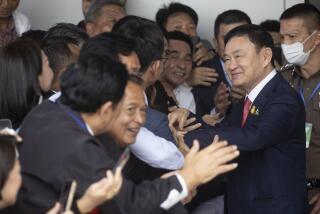Thanom Kittikachorn, 92; Thai Military Ruler Aided U.S. in Vietnam
- Share via
Thanom Kittikachorn, a military ruler of Thailand who helped the United States during the Vietnam War before being ousted in a popular uprising in 1973, has died. He was 92.
Thanom died late Wednesday at Bangkok Hospital, where he had been treated since Jan. 19 after suffering a stroke, a hospital statement said. He never fully recovered from brain surgery, it said.
Thanom came to be known as one of Thailand’s “Three Tyrants” when he ran the country in the 1960s and early ‘70s with his son, Col. Narong Kittikachorn, and Narong’s father-in-law, Field Marshal Praphas Charusathien.
The three were driven into exile after a bloody student-led uprising in October 1973. They were accused of nepotism, corruption and ordering troops to fire on protesters in the streets of Bangkok during the uprising. The official death toll in the uprising was 77, with hundreds injured, although many believe the number of dead was higher.
Thanom’s regime was noted for its close ties with the United States.
During the Vietnam War, his government allowed tens of thousands of U.S. servicemen to be stationed in Thailand and served as host for U.S. air bases from which much of the bombing of North Vietnam and Laos was carried out.
At the same time, his regime’s heavy-handed rule brought resentment at home. Despite a veneer of democracy, Thanom’s government moved against even mild dissent, sweeping away opponents in parliament.
The regime’s leaders also allegedly used state funds for their own benefit -- most notably from the official lottery -- and steered contracts to cronies and companies in which they were given stakes.
After Thanom and his colleagues fell in 1973, the new government seized assets from the three worth about $30 million, which were believed to have been illegally acquired.
Thanom was allowed to return to Thailand in 1976 to serve as a Buddhist monk, sparking new demonstrations by pro-democracy protesters.
Many believed his return was meant to set the stage for a counterrevolution. But neither Thanom nor his two former ruling partners resumed any public political role.
Thanom was born in the northern province of Tak, the son of a junior government official. He attended Army Cadet Academy, and his move up the ranks was accelerated after he took part in a 1947 coup.
In the 1950s, Thanom entered politics and served in several posts. He was appointed as figurehead prime minister for nine months in 1958 before military strongman Sarit Thanarat assumed dictatorial powers until his death in 1963.
More to Read
Sign up for Essential California
The most important California stories and recommendations in your inbox every morning.
You may occasionally receive promotional content from the Los Angeles Times.













